Featured Farmer:
Melinda from The Homesteading and Preparedness Collective
Listen to her podcast episode 163: Melinda Adkins on Learning Homesteading Skills
Tell me a little about your urban farm. What’s its name? Size?
I live in Columbus, Ohio on a .28-acre plot. I have a corner lot and it is mostly flat but I do have a slight slope at the East side of my yard. My front yard is larger than my back yard; therefore, I planted a vegetable and rain garden in my front yard. The name of my homestead is “The Homesteading and Preparedness Collective.” I created a webpage to document, share my experiences, and create a homesteading community. The webpage is HPC-community.com
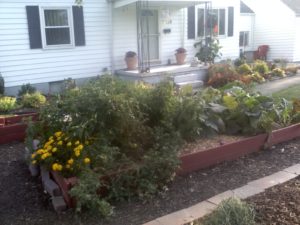
What are you growing?
I buy heirloom seeds or plants. I have tomatoes, green peppers, cucumbers, squash, Swiss chard, Rhubarb, chives, and green beans in my front yard. Early in the season, I had two or three types of lettuce. In the back yard, I have 6 blackberry bushes, 2 blueberry bushes, and a 10 x 20 strawberry patch. In the back yard I also, have herbs, potatoes, sweet potatoes, and onions in containers. I inoculated logs with mushroom spores and I am anticipating the crop this fall or spring.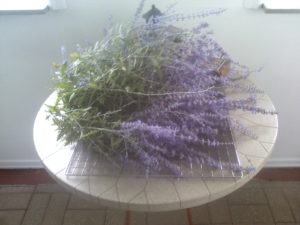
What kind of climate are you growing in?
Ohio weather is at times unpredictable. However typically, the cooler season starts in October or November and the coldest months are January and February. The average temperatures are from 5 degrees to 35 degrees Fahrenheit. With wind-chill, it can get 15 to 20 degrees below zero. The hottest months are July, August and September with average temperatures from 74 degrees to 91 degrees. The average monthly rainfall is 2 to 2 ½ inches or about 56 inches per year.
What initially got you interested in urban farming?
My mother and grandmother were gardeners and I helped them in their gardens. My grandmother had a green thumb. She filled her home with houseplants and she had a vegetable garden in her suburban back yard. Therefore, it was only natural for me to be a gardener too. When I bought my home, I was busy with a young son and new career and I didn’t plant much. After my son graduated from high school, I had more time and I started my urban garden.
Do you use any organic, permaculture, hydroponic, biodynamic, or other methods?
I have been using organic methods. To control weeds I lay layers of newspaper or fabric cloth down and then add mulch. I use salt and vinegar on any stubborn weeds or I use the old fashion back breaking method – hand pulling weeds. I use organic fertilizer and pest control. I have installed a rain garden and a water collection system. I have one straw bale garden. Last year I enrolled in the local Master Gardener program to learn more about these techniques and I will incorporate more methods.
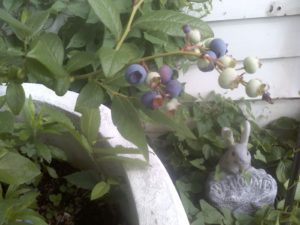
Do you use compost? Where do you get it and how does it help your plants?
I do use compost and I have a recycled wood framed compost pile but I will be replacing it with a purchased enclosed system. Due to the large amount of compost that I needed I purchased compost from our local landscape materials recycling center. The center has a drop off for leaf, soil, and wood.
Do you have any urban livestock? Chickens? Bees?
At this time, I do not have livestock. I plan to add bees.
What do you do with the food you grow?
I freeze, can and dehydrate the produce from my garden.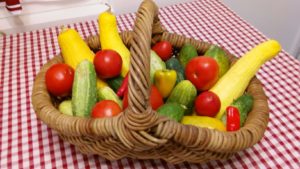
What is your greatest challenge in your farming endeavors?
Space and time are my greatest challenges. I have a corner lot next to a middle school and the students walk through my yard. My front yard is not fenced and I must plan my gardening away from the students walking path. In addition, I must consider my neighbor’s view of the street from his driveway. In addition, time is always an issue. There is never enough time in a day.
What do you enjoy the most about farming/growing food?
I enjoy the taste and smell of the food from my garden. And of course, I enjoy going out in the garden on a Sunday morning with a cup of coffee to watch the birds, bees, butterflies, and hummingbirds.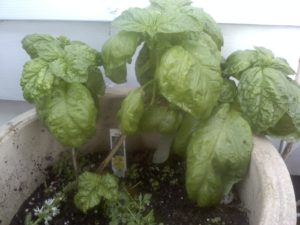 Why do you think urban farming is important?
Why do you think urban farming is important?
Urban farming gives urbanites the opportunity to enjoy fresh food from their garden. It connects people to their food through the planning, planting, growing, harvesting and preserving process.
Do you think this is a growing movement?
Yes. Consumer awareness of the importance of food, nutrition and farming education is growing. Families and communities see the need to pass gardening skills on to the next generation.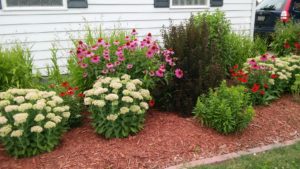
Is urban farming the future of agriculture?
It is a part of the future. As cities expand citizens should consider gardening to provide some of their food needs.
Do you have any advice for someone that’s just getting started?
New gardeners should join gardening clubs, a Master Gardener Program, or a community gardening group to learn from experienced gardeners and share gardening adventures. Plant your garden with food your family will eat. If you want to try something new, only plant a few. That way if your family won’t eat that vegetable, you have not wasted much garden space on it. Seek out gardening books at the library and use your local extension office online resources.
Anything else you’d like to add?
For people that rent and who may not be allowed to dig on the property owner’s property or have limited space, you can container garden or straw bale garden. These options are also great for people who have physical limitations.
About This Featured Farmer:
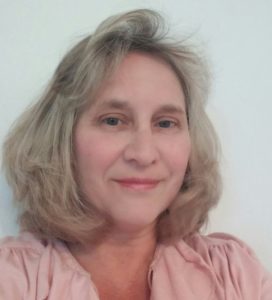 Melinda Lee is an Ohio Dominican alumni with a Bachelor’s of Criminal Justice. With 25 years of public service under her belt, her employment history includes The City of Columbus, The Columbus Public Schools, Franklin County Metro Parks, The Private Industry Council, and Ohio State University.
Melinda Lee is an Ohio Dominican alumni with a Bachelor’s of Criminal Justice. With 25 years of public service under her belt, her employment history includes The City of Columbus, The Columbus Public Schools, Franklin County Metro Parks, The Private Industry Council, and Ohio State University.
Melinda Lee’s journey to becoming an Urban Homesteader began when she was a child. Her mother and grandmother had gardens and they instilled the love and appreciation for gardening in her. After college she purchased a home in the city and secured employment with the local school district and shortly after a part-time Park Ranger position with the park system. The park had an 1880’s working farm on the property which she had the opportunity to visit and observe vintage skills. During her time as a Park Ranger her love for the outdoors and living a simpler life grew. She began incorporating skills she learned from the farm staff into her urban homestead.
*Disclosure:
Some of the links in our podcast show notes and blog posts are affiliate links and if you go through them to make a purchase, we will earn a nominal commission at no cost to you. We offer links to items recommended by our podcast guests and guest writers as a service to our audience and these items are not selected because of the commission we receive from your purchases. We know the decision is yours, and whether you decide to buy something is completely up to you.








Another great podcast, thank you! I like Melinda’s story, and her memories of watching her mother and grandmother garden and cook remind me of my grandmother. Unfortunately I didn’t appreciate what she could offer me when I was a child. Now that I’m grown and ready to learn, I live 7 hours away and have to squeeze every lesson I can In the short vacations I get back home. I’m looking forward to watching her (and you!) progress and grow!